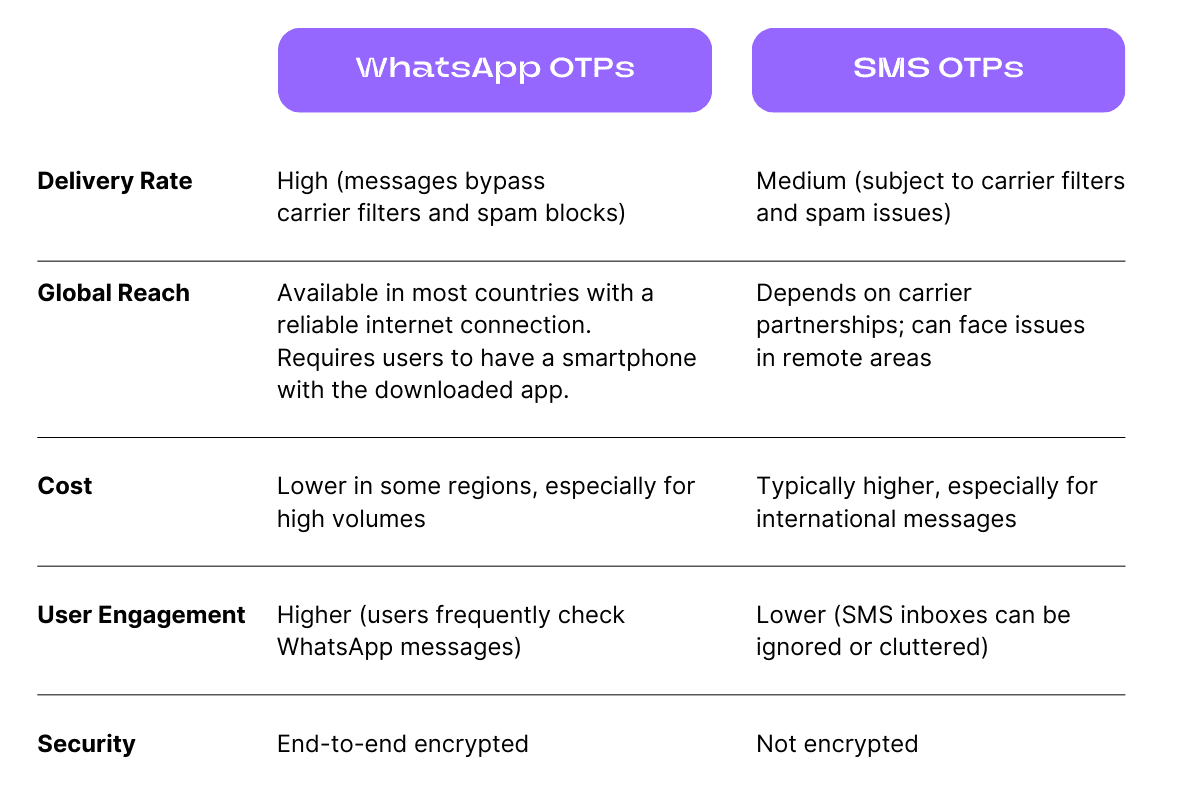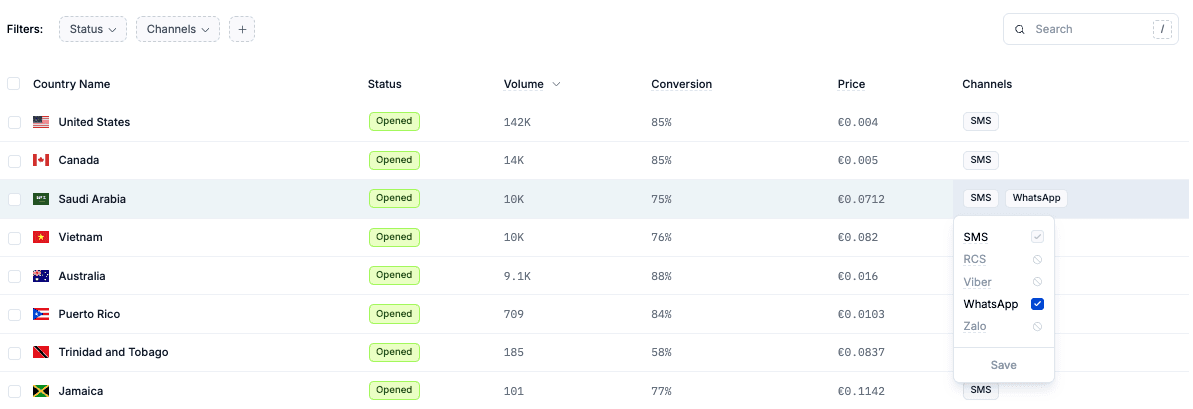Security Tips
29 janv. 2025
Les fraudeurs ont fait de l'authentification sécurisée des utilisateurs une priorité absolue pour les entreprises du monde entier. L'envoi d'OTP par WhatsApp pourrait-il être le changement dont votre entreprise a besoin ?
L'authentification n'est plus seulement une question de sécurité, c'est aussi une question d'expérience fluide. Lorsque les SMS OTP montrent leurs limites, les OTP envoyés via WhatsApp se profilent comme une alternative moderne et conviviale. Dans cet article, nous examinerons pourquoi les WhatsApp OTP gagnent du terrain et comment ils peuvent transformer votre approche de la vérification des utilisateurs.
Qu'est-ce qui rend les WhatsApp OTP uniques ?
Si vous avez déjà eu du mal avec des codes SMS retardés ou si vous vous êtes inquiété de failles de sécurité, les WhatsApp OTP peuvent sembler être une bouffée d'air frais. Au lieu de s'appuyer sur des canaux SMS traditionnels, cette méthode exploite l'application de messagerie la plus populaire au monde, avec 2,8 milliards d'utilisateurs actifs mensuels.
Dans des régions comme l'Inde, le Brésil et l'Indonésie, où l'internet mobile domine, WhatsApp offre une alternative abordable et fiable aux SMS, qui peuvent être coûteux ou incohérents. Et soyons honnêtes, les gens sont déjà sur WhatsApp. Pourquoi ne pas les rencontrer là où ils sont ?
Avec un chiffrement de bout en bout, des taux de livraison élevés, et une plateforme de confiance pour les utilisateurs, les WhatsApp OTP redéfinissent les normes de l'authentification.
Pourquoi les entreprises choisissent-elles les WhatsApp OTP plutôt que les SMS ?
À mesure que les exigences de la vérification des utilisateurs modernes augmentent, les SMS OTP ont commencé à révéler leurs limites. Les retards de livraison, les boîtes de réception encombrées et le manque de chiffrement peuvent créer des goulets d'étranglement frustrants. Les OTPs WhatsApp interviennent pour relever ces défis, offrant :
1. Des taux de livraison plus élevés
Contrairement aux SMS, les messages WhatsApp bypassent les filtres des opérateurs et les bloqueurs de spam, garantissant que les OTP atteignent réellement leur destination. C'est un souci de moins pour vous et vos utilisateurs.
2. Efficacité économique
Alors que les coûts des SMS peuvent exploser, surtout pour les messages internationaux, WhatsApp s'appuie sur les données Internet, ce qui le rend considérablement moins cher, en particulier pour les entreprises qui opèrent à grande échelle.
3. Meilleure interaction utilisateur
Voici un fait amusant : les utilisateurs vérifient WhatsApp jusqu'à 30 fois par jour en moyenne, alors que les SMS sont souvent ignorés dans des boîtes de réception encombrées. En envoyant des OTP via WhatsApp, vous exploitez une plateforme que les utilisateurs priorisent naturellement.
4. Sécurité renforcée
Contrairement aux SMS, les messages WhatsApp sont chiffrés de bout en bout, les rendant pratiquement impossibles à intercepter. C'est comme envoyer vos informations sensibles par un coffre-fort sécurisé plutôt que par une enveloppe en papier.
Quelles sont les principales différences entre les OTP WhatsApp et les OTP SMS ?
En ce qui concerne la livraison de mots de passe à usage unique, le choix entre WhatsApp et SMS n’est pas seulement une question de technologie, c’est une question de stratégie. Chaque canal a ses forces, mais alors que les entreprises cherchent à équilibrer sécurité, coût et engagement utilisateur, les OTP WhatsApp émergent comme l'option préférée dans de nombreux scénarios.
Pour comprendre pourquoi, décomposons leurs différences selon des dimensions clés :

Alors que les OTP SMS ont longtemps été la norme pour l'authentification, les OTP WhatsApp offrent une alternative moderne qui s'aligne sur le comportement des utilisateurs d'aujourd'hui et les avancées technologiques.
En tirant parti de WhatsApp, les entreprises peuvent s'attaquer à des points sensibles tels que la fiabilité de livraison, l'engagement utilisateur et la gestion des coûts. Par exemple, la capacité de WhatsApp à contourner les filtres des opérateurs garantit que les OTP sont livrés de manière cohérente, même en cas de congestion réseau ou dans des régions avec une infrastructure SMS peu fiable.
Cela dit, les SMS demeurent un canal de sauvegarde critique, en particulier pour les utilisateurs qui n'ont pas WhatsApp installé ou qui n'ont pas accès à Internet. Combiner les deux canaux dans une stratégie multicanal assure flexibilité et fiabilité, permettant aux entreprises de s'adapter aux besoins individuels des utilisateurs en temps réel.
En fin de compte, la décision entre WhatsApp et SMS ne doit pas consister à choisir l'un plutôt que l'autre, il s'agit de les utiliser ensemble pour maximiser les taux de livraison, la sécurité et la satisfaction des utilisateurs.
Comment pouvez-vous envoyer des OTP via WhatsApp avec Prelude ?
La bonne nouvelle est que l'intégration des OTP WhatsApp dans votre entreprise ne nécessite pas de révision technique. Avec des outils comme Prelude, l'intégration des OTP WhatsApp dans votre flux d'authentification devenant un processus fluide et efficace :
Activer les canaux : sur votre compte Prelude, choisissez les pays et les canaux à activer (WhatsApp, SMS, ou les deux),
Génération d'OTP : lorsqu'un utilisateur demande une vérification, votre application appelle l'API de Prelude pour générer un OTP unique,
Livraison intelligente : Prelude détermine automatiquement le meilleur canal (WhatsApp ou SMS) pour livrer l'OTP en temps réel,
Vérification : Les utilisateurs saisissent l'OTP dans votre application, et Prelude le valide instantanément.

Ce système multicanal garantit des taux de livraison de 95 %, même dans des régions avec une couverture cellulaire irrégulière ou des coûts SMS élevés.
Devriez-vous utiliser des OTP WhatsApp ou SMS ? Pourquoi pas les deux ?
Choisir entre WhatsApp et SMS peut sembler une question de camp, mais pourquoi ne pas laisser le système travailler pour vous ?
La technologie multi-route de Prelude analyse les conditions en temps réel (comme la localisation de l'utilisateur, le type de dispositif et la force du réseau) pour sélectionner le canal le plus fiable pour chaque utilisateur.
Par exemple :
Si un utilisateur se trouve dans une zone rurale avec une mauvaise couverture cellulaire, WhatsApp devient le canal par défaut,
Si l'utilisateur n'a pas WhatsApp installé, le système utilise les SMS.
En tirant parti des données en temps réel et en éliminant les conjectures, les entreprises peuvent optimiser les coûts et garantir que les OTP sont livrés sans retards.
Tirez parti de plusieurs canaux fait d'ailleurs parties des bonnes pratiques pour l'envoi d'OTP que nous recommandons à nos clients !
Quel est l'avenir de l'authentification avec les WhatsApp OTPs ?
Engager les utilisateurs au-delà de la vérification
Contrairement aux SMS, les OTP WhatsApp dépassent les interactions transactionnelles. Ils ouvrent la voie à la communication contextuelle, comme les rappels, les mises à jour de compte ou les conseils. De plus, des médias riches tels que des logos ou des modèles de marque aident à maintenir la cohérence de la marque, rendant chaque interaction professionnelle et axée sur l'utilisateur.
Atteindre des marchés sous-desservis
Les OTP WhatsApp comblent les lacunes dans les régions où les SMS ont des difficultés. Pour les zones avec une mauvaise couverture cellulaire mais un internet stable, ou dans des marchés sensibles aux coûts, WhatsApp devient une alternative fiable et abordable. Cela rend l'authentification plus inclusive et adaptable aux réalités locales.
Construire la confiance à travers la sécurité
Avec un chiffrement de bout en bout, WhatsApp fournit de meilleures protections contre les violations de données et la fraude. Une communication claire et sécurisée renforce la confiance des utilisateurs, ce qui est de plus en plus critique dans le paysage numérique d'aujourd'hui.
Permettre flexibilité multicanale
Aucun canal unique n'est parfait. Combiner WhatsApp et SMS dans une approche multicanal assure la fiabilité. Les systèmes qui basculent automatiquement en fonction des préférences utilisateur ou des conditions en temps réel garantissent une authentification fluide, où que soient vos utilisateurs.
En adoptant les OTP WhatsApp, les entreprises n'améliorent pas seulement la sécurité, elles transforment l'authentification en une opportunité de s'engager, d'innover et de bâtir la confiance.
Avec les OTP WhatsApp, vous pouvez réduire les coûts, améliorer la sécurité et rencontrer les utilisateurs là où ils se trouvent, sur la plateforme de messagerie la plus populaire au monde. Associé au système multicanal intelligent de Prelude, vous ne vous contentez pas d'améliorer l'authentification ; vous établissez une nouvelle norme pour l'expérience utilisateur.
Vous souhaitez simplifier votre processus d'authentification ? Essayez Prelude gratuitement ou contactez notre équipe de vente pour découvrir comment nous pouvons vous aider à réduire les coûts et à améliorer les taux de conversion avec des solutions fiables et sans fraude.
Auteur

Matias Berny
PDG
Derniers Articles

